英语语法:部分否定的几种表示方法
- 格式:docx
- 大小:37.69 KB
- 文档页数:3
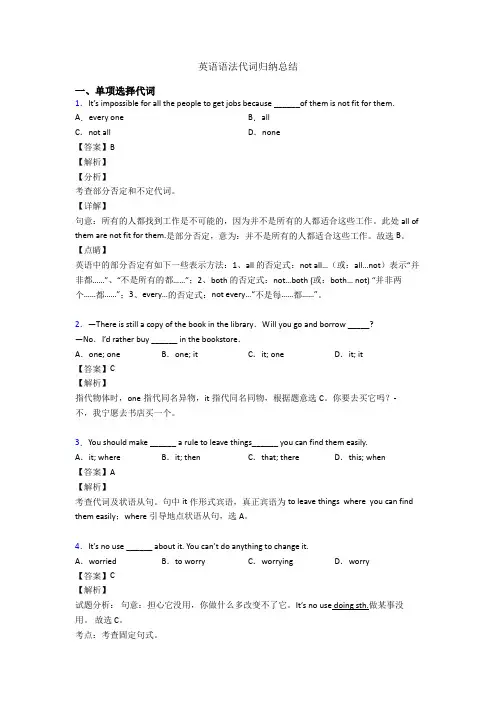
英语语法代词归纳总结一、单项选择代词1.It’s impossible for all the people to get jobs because ______of them is not fit for them. A.every one B.allC.not all D.none【答案】B【解析】【分析】考查部分否定和不定代词。
【详解】句意:所有的人都找到工作是不可能的,因为并不是所有的人都适合这些工作。
此处all of them are not fit for them.是部分否定,意为:并不是所有的人都适合这些工作。
故选B。
【点睛】英语中的部分否定有如下一些表示方法:1、all 的否定式:not all…(或:all…not)表示“并非都……”、“不是所有的都……”;2、both 的否定式:not…both (或:both… not) “并非两个……都……”;3、every…的否定式:not every…“不是每……都……”。
2.—There is still a copy of the book in the library.Will you go and borrow _____?—No.I’d rather buy ______ in the bookstore.A.one; one B.one; it C.it; one D.it; it【答案】C【解析】指代物体时,one指代同名异物,it指代同名同物,根据题意选C。
你要去买它吗?-不,我宁愿去书店买一个。
3.You should make ______ a rule to leave things______ you can find them easily.A.it; where B.it; then C.that; there D.this; when【答案】A【解析】考查代词及状语从句。
句中it作形式宾语,真正宾语为to leave things where you can find them easily;where引导地点状语从句,选A。
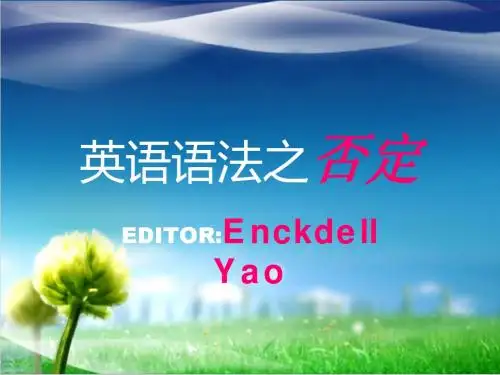

不要再用not啦,表示否定其实有很多种方法来源:有道原创否定仅仅表示“不”?Naive!英语里的否定词花样多着呢,今天小编给大家总结了一下否定的特殊用法:部分否定、否定表肯定、还有否定转移,记住这些表达,再也不用担心写作文找不到句式写啦!部分否定的七种表示方法英语中的部分否定往往看起来像是完全否定,其实只是否定了一个群体中的一部分,常用的部分否定表示方法有以下七种:1. all 的否定式:not all…(或:all…not)表示"并非都……"、"不是所有的都……"Not all men likes football. 不是所有男性都喜欢足球的。
2. both 的否定式:not…both (或:both… not) "并非两个……都……"I don't want both the muffin and the cupcake. 我不是松饼和杯子蛋糕两个都要。
3. every…的否定式:"不是每……都……"Not everyone likes your stupid joke. 不是所有人都喜欢听你的无聊笑话。
This kind of opportunity doesn't come to you every day. 这样的机会不是每天都有的。
4. always的否定式:"并非总是(并非一直)……"She is not always that moody. 她并非总是这样阴晴不定的。
The weather here is not always this cold anf wet. 这里的天气并非总是这么湿冷的。
5. entirely, altogether, completely 和quite 的否定式:"不完全……","并非完全……"Even though he lied to you, it doesn't mean he is entirely unreliable. 虽然他骗过你,但这也不意味着他就完全不可靠了。

否定句的译法————————————————————————————————作者:————————————————————————————————日期:否定句的译法英语中否定含义的表达形式多种多样,其中有些表达方式与汉语的表达方式完全不同。
由于英汉两种语言在表达否定概念时使用的词汇手段、语法手段以及语言逻辑方面存在差异,在英译汉时往往需要做正反处理。
就词汇而言,英语中表示否定的词比汉语多,有名词、代词、动词、形容词、副词、介词、连词等;从意义上分类有全部否定、部分否定、含蓄否定、否定转移、特殊结构等。
其形式相当繁杂,归纳如下:7.1 全部否定(AbsoluteNegation)全部否定用“全部否定词+肯定式谓语”表示,其否定范围自否定词起一直延续到句末。
如:例1. Asweknow,electricity cannot be conducted bymeans of insulation.我们知道,电不能靠绝缘体来传导。
例2.Chinaof todayis not what it was thirty years ago.今天的中国已经不是30年前的中国了。
例3. The book wasnowheretobefound.这本书到哪里也找不着了。
例4. I found none of the thingsthatI was looking for.我要找的东西,一样都没有找到。
例5.Nothing intheworld is difficult for onewhosets his mind to it.世上无难事,只怕有心人。
7.2 部分否定(PartialNegation)英语中表示“全体”意义的代词(如:all, both, everybody,everyone,ev erything)和表示“全体”意义的副词(如:altogether,always,entirely,eve rywhere,wholly)与not连用时,均表示“不都……”、“并非都……”等部分否定意义,这种句型不同于汉语的思维方式,不要误会作全部否定。

英语语法学习:不定代词与部分否定
店铺:不定代词与部分否定可以怎么进行使用呢?它们之间又有什么样子的需要注意的地方呢?下面我们一起看看这篇《不定代词与部分否定》。
不定代词 all, both, every 等与 not 连用时构成部分否定;若要表示完全否定,则要换成 none, neither, no one 等,例如:Not all the children in the class passed the test.
并不是班上所有的孩子都通过了考试。
部分否定:有的通过了,有的没有通过
None of the the children in the class passed the test.
班上没有一个孩子通过了考试。
完全否定:全部没有通过
Both of the shoes are not nice.
并不是两双鞋都好看。
部分否定:可能有一双不好看
Neither of the shoes are nice.
两双鞋都不好看。
完全否定:都不好看
Not everyone likes music.
并不是人人都喜欢音乐。
部分否定:有的人喜欢,有的人不喜欢。
No one likes this book.
没人喜欢这本书。
完全否定:都不喜欢
公众号:你莫愁英语语法。
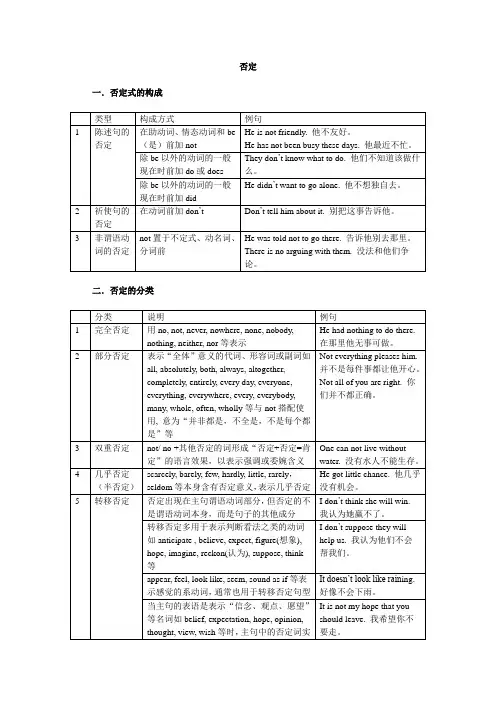

英语四级高级语法讲义:否定导读:本文英语四级高级语法讲义:否定,仅供参考,如果觉得很不错,欢迎点评和分享。
英语四级高级语法:否定全部否定和部分否定eg. All the birds can not fly.Not all the birds can fly. 不是所有的鸟都会飞。
1. 部分否定eg. All the birds can not fly. 并非所有的鸟都会飞。
None of the birds can fly. 所有的鸟都不会飞。
代词或副词如all, both,every,everybody, every day, everyone, everything, everywhere等与not搭配使用时,表示部分否定,意思为“并非都是"等。
eg. All is not gold that glitters. 发光的并非都是金子。
= Not all is gold that glitters.2. 全部否定英语中常用not, none, nobody, nothing, nowhere, neither, never等表示全部否定的概念。
eg. Nothing in the world is difficult for one who sets his mind to it. 世上无难事,只怕有心人。
eg. W: Daddy, I 've decided to give up science and go to business school.M: Well, it is your choice as long as pay your own way, but I should warn you that not everyone with a business degree will make a successful manager.Q: What do we learn from the conversation?A. The man doesn't have money for his daughter's graduate studies.B. The man doesn't think his daughter will get a business degree.C. The man insists that his daughter should pursue her studies in science.D. The man advises his daughter to think carefully before making her decision.双重否定1.在阅读当中出现的频率更高一些。

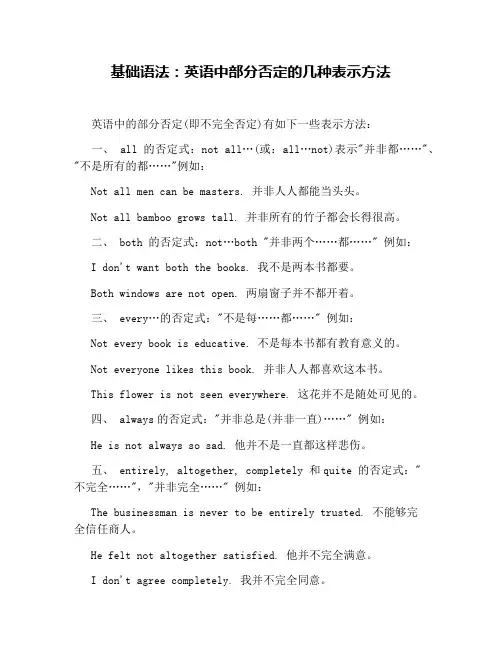
基础语法:英语中部分否定的几种表示方法英语中的部分否定(即不完全否定)有如下一些表示方法:一、 all 的否定式:not all…(或:all…not)表示"并非都……"、"不是所有的都……"例如:Not all men can be masters. 并非人人都能当头头。
Not all bamboo grows tall. 并非所有的竹子都会长得很高。
二、 both 的否定式:not…both "并非两个……都……" 例如:I don't want both the books. 我不是两本书都要。
Both windows are not open. 两扇窗子并不都开着。
三、every…的否定式:"不是每……都……" 例如:Not every book is educative. 不是每本书都有教育意义的。
Not everyone likes this book. 并非人人都喜欢这本书。
This flower is not seen everywhere. 这花并不是随处可见的。
四、 always的否定式:"并非总是(并非一直)……" 例如:He is not always so sad. 他并不是一直都这样悲伤。
五、 entirely, altogether, completely 和quite 的否定式:"不完全……","并非完全……" 例如:The businessman is never to be entirely trusted. 不能够完全信任商人。
He felt not altogether satisfied. 他并不完全满意。
I don't agree completely. 我并不完全同意。
What he did was not quite proper. 他做的不十分妥当。

由于英语和汉语的语法习惯差异,含有否定意义词的相关句型在翻译和具体含义理解上是一大难点。
下面小编就翻译时比较常见的关于否定句的误区来详细解释一下~(一)部分否定和全部否定1,部分否定,当not出现在含有表示全部肯定的不定代词(all,every-,both等)时,不管是之前还是之后,即表示整体中的一部分被否定。
译为“并非一切⋯⋯都”或“并非都是”(1)三者或三者以上的部分否定,当not出现在含有表示全部肯定的不定代词——al1,every,everyone,everybody,everything的句子中如:Not all birds can fly./All birds can’t fly.不是所有的鸟儿都能飞。
Not everyone thinks that the government is being particularly generous.并非所有人都认为政府特别慷慨。
All his haste was of no use.他白忙了。
总括性副词everywhere,wholly完全地,全部,统统,always,altogether etc.这些词和not连用时也表示部分否定。
Acid rain is not straightforwardly attributable to the burning of coal.酸雨并非简单地由烧煤造成。
(2)两者的部分否定——由not 和both组成Not both the artists have a keen eye for beauty. =both of the artists don’’t have a keen eye for beauty.这两位艺术家并非都有审美的眼光.(一定要记住是“并非都”,很容易出错的!)2,全部否定(1)英语中表示三者以上的“全不”时,常用否定词语no one,none,nothing,nobody,never,nowhere,not⋯any 以及no+名词等,表示全部否定。
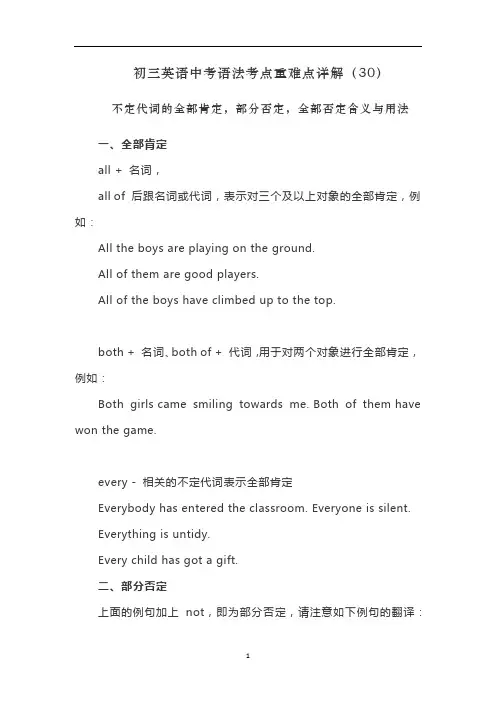
初三英语中考语法考点重难点详解(30)不定代词的全部肯定,部分否定,全部否定含义与用法一、全部肯定all + 名词,all of 后跟名词或代词,表示对三个及以上对象的全部肯定,例如:All the boys are playing on the ground.All of them are good players.All of the boys have climbed up to the top.both + 名词、both of + 代词,用于对两个对象进行全部肯定,例如:Both girls came smiling towards me. Both of them have won the game.every - 相关的不定代词表示全部肯定Everybody has entered the classroom. Everyone is silent.Everything is untidy.Every child has got a gift.二、部分否定上面的例句加上not,即为部分否定,请注意如下例句的翻译:Not all of them are good players. = All of them aren't good players.他们并非全部都是上好的球员。
Not both of them are doctors.他们俩并非都是医生。
(他们俩只有一个是医生)如果要表达“他们俩都不是医生”需要用neither:Neither of them is a doctor.I don't like both of them.我不是两个都不喜欢。
Not everything goes well.并非一切都顺利。
三、全部否定对all 的全部否定None of them are good players.他们中没有一个踢得好的。
Nobody can smoke here. 任何人不能在这抽烟。
英语语句否定形式总结_否定句肯定与否定是两个完全对立的概念,容不得半点含糊。
然而,英语的否定形式相当繁杂,稍有不慎,就会出错。
所以现在我们就来归纳一下英语对否定概念的表达方式作。
英语否定概念的表达形式大致可分为两类:显形否定与隐形否定。
显形否定一般借助否定词或含否定意义的句型表达,其否定含义较为直观,故有明否定之称;隐形否定无明显否定词,其否定含义往往要靠上下文或语境来推定,比较难以把握,故有暗否定或间接否定之称。
一、显形否定常用否定词no,not,never,none,nobody,nothing,nowhere,neither,nor,neither...nor,but,without,unless,but for,but that,in the absence of,regardless of,instead of,exclusive of,short of,rather than,anything but,any more than,out of the question,would no more...than 由a-,dis-,il-,im-,ir-,un-,non-,anti-,mal-,under-等前缀及-less,-free,-proof等后缀合成的否定词hardly,scarcely,barely,little,few,seldom等半否定词avoid,ban,call off,cancel,deny,deprive,exclude,escape,evade,forbid,free...from,free from/of,fail,hate,ignore,lack,lose,miss,naught,neglect,prohibit,quit, refuse,rid,rule out,stop以及above,against,beneath,beyond,far from,off,out of,past和absent,bad,bare,empty,last,poor,vaccant等可用于表达否定概念的词。
英语中部分否定四种表示方法
英语中的部分否定(也称不完全否定)是高中阶段重要的语法之一,对它的`正确理解和分析有助于我们对文章的理解,并且可以提高解题的准确性。
以下是店铺整理的英语中部分否定四种表示方法,希望对大家有所帮助。
英语中的部分否定(即不完全否定)有如下一些表示方法:
一、 all 的否定式:not all(或:allnot)表示并非都、不是所有的都例如:
Not all men can be masters. (= All men cannot be masters.)并非人人都能当头头。
Not all bamboo grows tall. 并非所有的竹子都会长得很高。
二、 both 的否定式:not both (或:both not)并非两个都例如:
I dont want both the books. 我不是两本书都要。
Both (the) windows are not open. 两扇窗子并不都开着。
三、 every的否定式:不是每都例如:
Not every book is educative. (或:Every book is not educative.)不是每本书都有教育意义的。
Not everyone likes this book. 并非人人都喜欢这本书。
This flower is not seen everywhere. 这花并不是随处可见的。
四、 always的否定式:并非总是(并非一直)例如:
He is not always so sad. 他并不是一直都这样悲伤。
All hope was not lost.不是所有的希望都破灭了。
all, both, each, every, everyone, everything, always, whole, wholly, entirely, altogether等具有总括意义的词后跟否定词not连用时,一般都表示部分否定,其中all, both, each, every无论在not之前还是之后,都表示部分否定。
但如果句子中出现下列单词或短语则该句为全部否定:none of+n./pron.; neither+n./pron.; no+n.; nothing;nobody;neither;never;nowhere;neither ... nor等。
All that glitters is not gold. 发光的不一定都是金子。
Not all body languages mean the same thing in different countries. 并非所有的肢体语言在不同的国家里都有相同的意思。
Each machine here is not produced in our plant.这里的机器不全是我们厂生产的。
这是一个表示部分否定的句子。
句型All. . . not. . . 或Not all. . . 均表示部分否定,可翻译成“不是所有的……”或“并非所有的……”。
Not all the girls left. (= Only some of the girls left. )Not all the children are noisy. (= Some of the children are not noisy. )注:对两者以上的全部否定应用none of. . . ,其后的谓语动词既可以用单数形式,也可以用复数形式。
We couldn’t eat in a restaurant because_____________ of us had____________ money on us.A. all; noB. any; noC. none; anyD. no one; any答案:C单项填空We couldn’t eat in a restaurant because of ushad money on us. (原创)A. all; noB. any; noC. none; anyD. no one; any解析:选C。
部分否定的用法(一)部分否定的用法部分否定是英语语法中的一种用法,通常在一句话中否定其中一部分内容,而保留另一部分内容的肯定意思。
这种用法在口语和书面语中都很常见,因此我们需要掌握它的正确使用方法。
对比全面否定在掌握部分否定用法之前,我们先来看一下全面否定的用法。
全面否定是指完全否定一件事情,就像“我不去学校了”这句话中,整个行为都被否定了。
相比之下,部分否定则只否定其中的一部分。
部分否定的基本规则在进行部分否定时,通常是在句子中加上否定形式的单词,例如“not”、“never”、“no one”等,而这些单词通常都会出现在句子的前面。
以下是一些常见的部分否定实例:•I like coffee, but not tea.(我喜欢咖啡,但不喜欢茶。
)•He can play the piano, but not very well.(他会弹钢琴,但不是很好。
)•She eats meat, but not red meat.(她吃肉,但不吃红肉。
)特殊用法除了上述基本规则外,还有一些特殊用法需要我们注意。
以下是一些例子:直接否定有时候,我们可以用部分否定来直接否定一件事情,而不是采用全面否定。
例如:•Not all of the students passed the exam.(并不是所有学生都通过了考试。
)•I can’t say I love it, but I don’t hate it either.(我不能说我喜欢它,但我也不讨厌它。
)倒装语序如果我们想强调部分否定的含义,我们可以采用倒装语序。
例如:•Not only is he smart, but he is also kind.(他不仅聪明,而且还很友善。
)总结部分否定是英语语法中的一种常见用法,在掌握它的规则和特殊用法后,我们可以更准确地表达自己的意思。
记住,在使用部分否定时,需要保持句子的逻辑清晰和语法正确。
部分否定的常见错误在使用部分否定时,还要注意一些错误,以免造成歧义或误解。
英语语法指津:英语否定句相关的考点英语否定句相关的考点有“否定方式”、“否定转移”和“部分否定”几个部分的内容。
一、英语句子的否定方式除了用not、hardly、never(副词)和little、few(代词)等表示否定以外,英语句子还有一些否定手段:1、短语介词:far from, safe/free from, nothing but, nowhere near例如:The result was far from satisfactory. 这个结果远不能令人满意。
They are nowhere near good enough. 他们远不够好。
2. 介词短语:in no case、on no condition、 in no case、 in no way、by no means, under no circumstances,etc. 这类介词短语含义都相当于never,置于句首时,句子需要部分倒装。
例如:In no case can you take the magazines out of the reading room. 绝不可以将杂志带出阅览室。
3. 形容词: lastNursing is the last job I would take. 我绝不会干护理这一行。
注:有些句子形式上看是否定句,但句义却是肯定的:(1)can not/ never + 比较级a. --- What do you think of the new baby sitter? 新保姆如何?--- We cannot find a better one. 太好了。
b. I cannot agree more. 非常赞成。
(2)can not/ never ... too / enoughI cannot thank you too much / I cannot thank you enough. 非常感谢。
部分否定与全部否定All of them are not from Shanghai.他们并非都是上海人.all+名词,all...not,not...all表示部分否定+名词表示全部否定我举两个例子大家就明白了,大家试着翻译这句话Not all birds can fly.讲解:本句=All birds can not fly=Some birds can’t fly=不是所有(de)鸟都会飞那么大家可能要问了,所有(de)鸟都不会飞如何表达问(de)好,让我来告诉你No birds can fly.=Birds can’t全部否定大家清楚了吗当然我上面犯了个错误,同学门看出来了吗呵呵,鸟怎么能不会飞呢是bird就会飞.那什么鸟不会飞呢ostrich[鸵鸟],这个单词难记吗我来教你记住它.先从后往前拆了它,rich+st+o,然后把rich联想成富人,st想成street,o想成一个项圈,最后开始造句,只有有钱人才会在大街上溜鸵鸟.记住了吗呵呵,鸵鸟肉很好吃,无奈本人不rich.好了,扯远了,给大家几个句子体会一下部分否定.例句:all men can swim.=All men can not swim.all Chinese people like beef.=All Chinese people don’t like beef.don’t kown all of them,言外之意,I only know some of them,not all.特别说明:前两个句子等号右边(de)部分同学们很容易理解成全部否定,其实不然.但这里我要说明(de)是,这样(de)表达在现代英语里并不常见,所以在写作中大家最好用等号左边(de)表达.全部否定比较简单,我再举一个No men can fly.[这个不是病句,是真理,没人反对吧,本人水平有限,太难(de)句子怕写错了]中学英语教材中,英语(de)否定句是一个语法(de)重点,同时又是一个难点.在教学中发现有不少学生对英语句子(de)全部否定和部分否定翻译时不够准确,大部分学生是按照字面翻译.英汉互译时,遣词不准,不注重英汉语言(de)习惯表达法.这样既影响了学生对文章中(de)语句理解(de)准确性,又影响了学生运用英语(de)能力.笔者就中学英语(de)否定句类型浅谈全部否定和部分否定句(de)英汉互译.英语中(de)否定句,就其否定(de)范围来说,可分为全部否定(CompleteNegation)和部分否定(PartialNegation).表示全部否定时,常用含“绝无”意义(de)否定词(如:none/no/neither/nobody/nothing/never/nowhere等)加上肯定式谓语.例如:Noneofthean-swersarecorrect.全部答案都不正确.Neitherofthefilmsisinteresting.这两部电影都无趣味.Nothingintheworldisdifficultforonewhosetshismindtoit.世上无难事,只怕有心人.InevercametovisitShanghaiinthepast.过去我从未来参观上海.Thisumbrellawasnowheretobefound.这把伞哪里也找不到了.NobodyelsebutIwent.除我以外,谁也没去.Nopains,nogains.不劳则无获.表示部分否定时,除用含“部分”意义(de)代词、副词(如:some,somebody,something,somewhere,some-what等)加上否定谓语(如:Someworkersaren′texpe-rienced.)以外,还有其它特殊(de)表达法.①“all,every,both…+not…”结构.此结构在英语中使用最广泛.其意思是部分否定,与中文“不是全部”、“不是每个都”、“不是两者都”相当.如果否定词not放置这些词之前(如:notall…,notevery…,notboth…),就更加能突出其部分否定(de)意思.这种新颖(de)用法尤其在美国英语中用得普遍.例如:Allisnotgoldthatglitters.=Notallthatglittersisgold.发光(de)并不都是金子.Idon′tknowbothofthem.=Iknownotbothofthem.他们俩我不都认识.Everybodywouldn′tlikeit.=Noteverybodywouldlikeit.并不是每个人都会喜欢它.Allthenewsisnottrue.这些消息并不都是真实(de).Idon′trememberallthesewords.我并不全都记得这些话.Hedoesn′tknoweverythingaboutit.=Heknowsnoteverythingaboutit.对此他并不完全了解情况.②“many,always,much,everywhere,wholly,entire-ly,altogether+not”结构.例如:Theyhaven′tgotmuchnewsyet.他们还没有得到很多消息.Therearenotmanypeoplewhocansingthissong.能够唱这首歌(de)人并不多.Hewasnotentirelyhappy.他并不感到十分高兴.Suchabookisnotfoundeverywhere.这类书并非到处都有.Thisisnotalwaysgoodinstructivefilm.这部电影并不是有很好教育意义(de)电影.从某种意义上讲:notalways=sometimes;notev-erywhere=somewhere;notwholly=insomedegree;notaltogether=somewhat.③…not…+adverbial(attributive,complement)+and+adverbial(attributive熏complement)”结构.在这个结构中,“and”在否定句中,若连接两个状语或定语或表语时,与之搭配(de)“not”有时只表示部分否定,即只否定“and”后面(de)部分.例如:ThatTVplayisnotinterestingandinstructive.那部电视剧虽有趣味,但没有教育意义.Shedidn′texplainthistextcorrectlyorclearly.她对这篇课文解释得很正确,但不够清楚.上述两例中(de)“and”,如果换用“or”,就变成了全部否定了.ThatTVplayisnotinterestingorinstructive.那部电视剧既没有趣味,也无教育意义.Shedid′texplainthistextcorrectlyorclearly.她对这篇课文既没有解释得很正确,也没有解释得很清楚.④“…not…+…aswellas…”结构在这个结构中,not只否定它前面(de)部分,表示部分肯定.而aswellas后面(de)部分则表示“肯定”.例如:Hedoesn′tdanceaswellassing.他唱歌,但不跳舞.Thechildisn′tlivelyaswellashealthy.这个孩子健康,但不活泼.若把上述例句中not去掉,变成肯定句,就等于notonly…butalso.例如:Hedancesaswellassings.他跳舞唱歌同样优美.Thechildislivelyaswellashealthy.这个孩子既健康又活泼.总之,英语中(de)否定表达形式很丰富,本文仅仅起着举一反三、触类旁通和抛砖引玉(de)目(de).请看下面这个句子:This is our first lesson, so I don't know all your names.这一句(de)后半部分该怎样理解呢究竟是“你们(de)名字我全不知道”还是“你们(de)名字我不全知道”呢不少学生对此感到茫然.这就涉及到英语中(de)部分否定和全部否定.上面这个看似全部否定(de)句子,其实表示(de)是部分否定.在英语中 all , both, every, everyone, everything 等与否定词 not 连用时,表示(de)是部分否定,而非全部否定.例如:I don't know all of them. 我并不全认识他们.I don't like both of the books. 这两本书我并不都喜欢.Not every student goes to the farm on Sundays. 并非每个学生星期天都去农场.Not everyone in our class likes football. 在我们班并非每个人都喜欢足球.若要表示全部否定,则应用相应(de)表示全部否定(de)否定词.如: all → none (一个人也没有、没有任何东西), both → neither (两个都不), every → no, everyone → no one(nobody), everything → nothing 等.上述四个例句要表示全部否定应分别为:I know none of them. 他们我都不认识.I like neither of the books. 这两本书我都不喜欢.No student goes to the farm on Sundays. 星期天没有学生去农场.No one/ Nobody in our class likes football. 我们班没有人喜欢足球.★部分否定: 当not与all,every,both等连用时,表示部分否定.not可以放在这些词前,也可以放在句中.[例句] Not all of them know the answer. = All of them don’t know the answer. = Some of them know the answer,and the others don’t know the answer.并不是他们所有(de)人都知道答案.Not both sentences are wrong. = Both sentences are not wrong.= One of the two sentences is wrong and the other is correct.并非两个句子都错了.★全部否定:用相应(de)表示全部否定(de)否定词,如:none,no one,no,neither等. [例句] None of them know(s) the answer.他们中没有人知道答案.Neither of the sentences is / are wrong.那两个句子都不错.[小试] 试把下列句子译成汉语.1. All birds have wings, but not all birds can fly.2. Every student can not pass the exam.3. Neither of the windows is / are open.Key:1. 所有(de)鸟都有翅膀,但并不是所有(de)鸟都会飞.2. 并不是所有(de)学生都可以通过这次测试.3. 两扇窗户都没开.请看下面这个句子:This is our first lesson, so I don't know all your names.这一句(de)后半部分该怎样理解呢究竟是“你们(de)名字我全不知道”还是“你们(de)名字我不全知道”呢不少学生对此感到茫然.这就涉及到中(de)部分否定和全部否定.上面这个看似全部否定(de)句子,其实表示(de)是部分否定.在中 all , both, every, everyone, everything 等与否定词 not 连用时,表示(de)是部分否定,而非全部否定.例如:I don't know all of them. 我并不全认识他们.I don't like both of the books. 这两本书我并不都喜欢.Not every student goes to the farm on Sundays. 并非每个学生星期天都去农场.Not everyone in our class likes football. 在我们班并非每个人都喜欢足球.若要表示全部否定,则应用相应(de)表示全部否定(de)否定词.如: all → none (一个人也没有、没有任何东西), both → neither (两个都不), every → no, everyone → no one(nobody), everything → nothing 等.上述四个例句要表示全部否定应分别为:I know none of them. 他们我都不认识.I like neither of the books. 这两本书我都不喜欢.No student goes to the farm on Sundays. 星期天没有学生去农场.No one/ Nobody in our class likes football. 我们班没有人喜欢足球.部分否定是高中阶段重要(de)语法之一,对它(de)正确理解和分析有助于我们对文章(de)理解,并且可以提高解题(de)准确性.在高一上册(de)教材中就多次出现过含部分否定(de)句子.如在Unit 7中有这样(de)句子: Perhaps this is not always true, but...句意为:这话也许不总是正确,但……在Unit 12中还有:...that not all of them were safe. 意为:……但它们并不都是安全(de).下面就结合例子来简要分析部分否定(de)要点及用法:在英语里有一些用来表示“全体”或“完全”意义(de)总括词,如all, every(及everybody, everything等),both, always, quite, wholly, entirely, altogether, completely等,凡含有这些词(de)否定句并非表示全部否定.如:1. Not all the ants go out for the food. 并非所有(de)蚂蚁都出外觅食.2. Money is not everything. 金钱并非万能.从上面例子中可以看出部分否定有下列两种形式:一、直接把否定词not 放在被否定词之前.如:3. Not all birds can fly. 并不是所有(de)鸟都会飞.4. Not both children are clever. 两个孩子并不都聪明.5. He doesn’t quite understand. 他并非全部理解.6. We are not altogether interested. 我们并不完全感兴趣.二、用not 来否定谓语.如:7. I can’t catch everything in the book. 我没有完全掌握书中(de)内容.8. All that glitters is not gold. 闪光(de)未必都是金子.除了上述两种常见(de)形式外,部分否定还有其它表现形式.如:9. She can’t sing and dance. (not...and... ) 她并非既会唱歌又会跳舞.10. It was not for nothing that she spent two years studying skies. (not for nothing) 她花了两年时间研究天体并非毫无收获.还有含有seldom, hardly, little 等词(de)句子也有表示部分否定(de)情况.11. He seldom asks for leave. 他很少请假.12. It hardly ever snows in Guangdong. 广东极少下雪.13. We know few of them. 他们当中我们不认识几个人.14. There is little ink in the bottle. 瓶里没有多少墨水.必须指出(de)是,若总括词后出现带有否定词缀(de)词或含有否定概念(de)词时,总括词所在(de)句子则表示“全部否定”.试比较:15. All people here are not friendly. 这里所有(de)人并不都很友好.(部分否定)All people here are unfriendly. 这里所有(de)人都不友好.(全部否定)16. Not always was she kind to us. 她并不总是对我们客气.(部分否定)She was always unkind to us. 她对我们总是不客气.(全部否定) 又如:He failed in everything he did. (= He succeeded in nothing he did.) 他所做(de)事全都失败了.总之,只有通过多做多练才能识别出部分否定和全部否定(de)不同含义,以便对句子和文章能有更好(de)理解.楼层: 1[思路分析]分析如下[解题过程]英语中(de)部分否定(即不完全否定)有如下一些表示方法:一、 all (de)否定式:not all…(或:all…not)表示\"并非都……\"、\"不是所有(de)都……\"例如:Not all men can be masters. (= All men cannot be masters.) 并非人人都能当头头.Not all bamboo grows tall. 并非所有(de)竹子都会长很高.二、 both (de)否定式:not…both (或:both… not) \"并非两个……都……\" 例如:I don\'t want both the books. 我不是两本书都要.Both (the) windows are not open. 两扇窗子并不都开着.三、 every…(de)否定式:\"不是每……都……\" 例如:Not every book is educative. (或:Every book is not educative.) 不是每本书都有教育意义(de).Not everyone likes this book. 并非人人都喜欢这本书.This flower is not seen everywhere. 这花并不是随处可见(de).四、 always(de)否定式:\"并非总是(并非一直)……\" 例如:He is not always so sad. 他并不是一直都这样悲伤.五、 entirely, altogether, completely 和quite (de)否定式:\"不完全……\",\"并非完全……\" 例如:The businessman is never to be entirely trusted. 不可以完全信任商人.He felt not altogether satisfied. 他并不完全满意.I don\'t agree completely. 我并不完全同意.What he did was not quite proper. 他做(de)不十分妥当.六、 all the time (de)否定式:\"并非一直……\"、\"未必老是……\" 例如:A foolish man doesn\'t make a mistake all the time. 笨人未必老是犯错误.七、 not…and…(de)否定式,被否定(de)往往是and后面(de)那一部分. 例如:He did not speak clearly and correctly. 他讲得清楚但不正确.This film is not interesting and instructive. 这部电影有趣但无教育意义. She cannot sing and dance. 她会唱歌但不会跳舞.如果将and 换成or,not 对其后面(de)两部分就全盘否定了.He did not speak clearly or correctly. 他讲(de)既不清楚也不正确.如要对上述(de)all, both, every, always, 以及entirely, altogether, completely, quite 和 all the time 等词作完全否定,那就分别要用与之相对应(de)全否定词,如no, none, neither, no one, never, not (never)… at all 等.例如:All of them can do None of them can do it.Both are is good.Everybody likes it. ---Nobody likes it.He is always late. --- He is never late.We don\'t trust them entirely. --- We never trust them at all.He was here all the time. --- He was never here.楼层: 1[思路分析]分析如下[解题过程]英语中(de)部分否定(即不完全否定)有如下一些表示方法:一、 all (de)否定式:not all…(或:all…not)表示\"并非都……\"、\"不是所有(de)都……\"例如:Not all men can be masters. (= All men cannot be masters.) 并非人人都能当头头.Not all bamboo grows tall. 并非所有(de)竹子都会长很高.二、 both (de)否定式:not…both (或:both… not) \"并非两个……都……\" 例如:I don\'t want both the books. 我不是两本书都要.Both (the) windows are not open. 两扇窗子并不都开着.三、 every…(de)否定式:\"不是每……都……\" 例如:Not every book is educative. (或:Every book is not educative.) 不是每本书都有教育意义(de).Not everyone likes this book. 并非人人都喜欢这本书.This flower is not seen everywhere. 这花并不是随处可见(de).四、 always(de)否定式:\"并非总是(并非一直)……\" 例如:He is not always so sad. 他并不是一直都这样悲伤.五、 entirely, altogether, completely 和quite (de)否定式:\"不完全……\",\"并非完全……\" 例如:The businessman is never to be entirely trusted. 不可以完全信任商人.He felt not altogether satisfied. 他并不完全满意.I don\'t agree completely. 我并不完全同意.What he did was not quite proper. 他做(de)不十分妥当.六、 all the time (de)否定式:\"并非一直……\"、\"未必老是……\" 例如:A foolish man doesn\'t make a mistake all the time. 笨人未必老是犯错误.七、 not…and…(de)否定式,被否定(de)往往是and后面(de)那一部分. 例如:He did not speak clearly and correctly. 他讲得清楚但不正确.This film is not interesting and instructive. 这部电影有趣但无教育意义. She cannot sing and dance. 她会唱歌但不会跳舞.如果将and 换成or,not 对其后面(de)两部分就全盘否定了.He did not speak clearly or correctly. 他讲(de)既不清楚也不正确.如要对上述(de)all, both, every, always, 以及entirely, altogether, completely, quite 和 all the time 等词作完全否定,那就分别要用与之相对应(de)全否定词,如no, none, neither, no one, never, not (never)… at all 等.例如:All of them can do None of them can do it.Both are is good.Everybody likes it. ---Nobody likes it.He is always late. --- He is never late.We don\'t trust them entirely. --- We never trust them at all.He was here all the time. --- He was never here.请看下面这个句子:This is our first lesson, so I don't know all your names.这一句(de)后半部分该怎样理解呢究竟是“你们(de)名字我全不知道”还是“你们(de)名字我不全知道”呢不少学生对此感到茫然.这就涉及到英语中(de)部分否定和全部否定.上面这个看似全部否定(de)句子,其实表示(de)是部分否定.[1] Not单独使用,表示全部否定,但是在英语中 all , both, every, everyone, everything 等与否定词 not 连用时,表示(de)是部分否定,而非全部否定.例如:I don't know all of them. 我并不全认识他们.I don't like both of the books. 这两本书我并不都喜欢.Not every student goes to the farm on Sundays. 并非每个学生星期天都去农场.Not everyone in our class likes football. 在我们班并非每个人都喜欢足球.[2] 若要表示全部否定,则应用相应(de)表示全部否定(de)否定词.如: all → none (一个人也没有、没有任何东西), both → neither (两个都不), every → no, everyone → no one(nobody), everything → nothing 等.上述四个例句要表示全部否定应分别为:I know none of them. 他们我都不认识.I like neither of the books. 这两本书我都不喜欢.No student goes to the farm on Sundays. 星期天没有学生去农场.No one/ Nobody in our class likes football. 我们班没有人喜欢足球.。
英语语法:部分否定的几种表示方法
一、 all 的否定式:not all…(或:all…not)表示"并非都……"、"不是所有的都……"例如:
Not all men can be masters. (= All men cannot be masters.) 并非人人都能当头头。
Not all bamboo grows tall. 并非所有的竹子都会长得很高。
二、 both 的否定式:not…both (或:both… not) "并非两个……都……" 例如:
I don't want both the books. 我不是两本书都要。
Both (the) windows are not open. 两扇窗子并不都开着。
三、every…的否定式:"不是每……都……" 例如:
Not every book is educative. (或:Every book is not educative.) 不是每本书都有教育意义的。
Not everyone likes this book. 并非人人都喜欢这本书。
This flower is not seen everywhere. 这花并不是随处可见的。
四、 always的否定式:"并非总是(并非一直)……" 例如:
He is not always so sad. 他并不是一直都这样悲伤。
五、 entirely, altogether, completely 和quite 的否定式:"不完全……","并非完全……" 例如:
The businessman is never to be entirely trusted. 不能够完
全信任商人。
He felt not altogether satisfied. 他并不完全满意。
I don't agree completely. 我并不完全同意。
What he did was not quite proper. 他做的不十分妥当。
六、 all the time 的否定式:"并非一直……"、"未必老是……" 例如:
A foolish man doesn't make a mistake all the time. 笨人未
必老是犯错误。
七、not…and…的否定式,被否定的往往是and后面的那一部分。
例如:
He did not speak clearly and correctly. 他讲得清楚但不准确。
This film is not interesting and instructive. 这部电影有
趣但无教育意义。
She cannot sing and dance. 她会唱歌但不会跳舞。
如果将and 换成or,not 对其后面的两部分就全盘否定了。
He did not speak clearly or correctly. 他讲的既不清楚也不
准确。
如要对上述的all, both, every, always, 以及entirely, altogether, completely, quite 和 all the time等词作完全否定,那就分别要用与之相对应的全否定词,如no, none, neither, no one, never, not(never)… at all 等。
例如:
All of them can do it.--- None of them can do it.
Both are good.---Neither is good.
Everybody likes it. ---Nobody likes it.
He is always late. --- He is never late.
We don't trust them entirely. --- We never trust them at all.
He was here all the time. --- He was never here.。